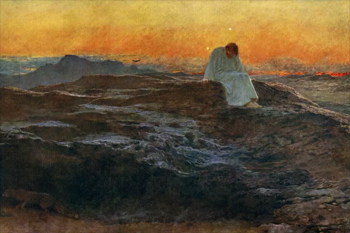For Sunday February 21, 2021
Lectionary Readings (Revised Common Lectionary, Year B)
Genesis 9:8-17
Psalm 25:1-10
1 Peter 3:18-22
Mark 1:9-15
I was a little girl in Sunday School when I first learned the story of Jesus’s temptation in the wilderness. My teacher, a grandmotherly woman in a hairnet and beige panty hose, had the Judean wilderness stretched across a flannelgraph board in front of my first-grade class. At the far left of the fuzzy felt landscape, an innocuous-looking devil — scrawny, red-suited, and fork-tailed — stooped in the sand, reaching for a loaf-shaped stone. To his right, a supremely undisturbed Jesus towered over the landscape in a pristine white robe, his finger pointed devastatingly at his tempter.
To be fair, my teacher was doing the best she could to ease us very young kids into a story that might have frightened us. I give her credit for that. But here’s the problem: what I absorbed from her on that Sunday morning was a superhero version of Jesus that left no room for his humanity. At no point in my childhood or young adulthood did it occur to me that Jesus actually struggled in the wilderness. That he hurt. That he hungered. That he wept, thirsted, wrestled, and suffered. Instead, I assumed that his triumph over evil was a foregone conclusion — a “trial” that cost him nothing.
It has taken me a long time to shed the muscular Jesus of my childhood. To be honest, I sometimes still long for him. I long for his divinity — the certainty of it, the mighty, magical promise of it — to overwhelm his humanity like a bright and reassuring halo. But Lent isn’t a season for unshakeable superheroes. It’s a season for vulnerable creatures whose wilderness journeys are never easy or straightforward. It’s a season of shadow, a season when our certainties go into the fire and burn down to ash. It is a season of vulnerability, honesty, humility, and penitence.
All of that to say: to read Jesus’s wilderness story as a story of facile triumph is to miss the point. Why? Because we need the Jesus of the desert. We need to know that he wrestled with real demons and real dangers during those forty days of temptation. As alluring as it might be to cling to a divine superhero, we need the Jesus who endured a terrain where the Holy Spirit, Satan, the wild beasts, and the angels resided together. Alone, we’ll never survive such a dangerous place. With a companion who knows the way, though, we will.
Unlike his counterparts, Matthew and Luke, Mark offers us no colorful details about Jesus’s experience in the wilderness. We don’t learn what Satan’s specific temptations were, or how Jesus responded to them. All Mark gives us are a few terse sentences: “The Spirit immediately drove Jesus out into the wilderness. He was in the wilderness for forty days, tempted by Satan. He was with the wild beasts, and angels waited on him.”
 |
As I reflect on Mark’s version of the story, three details stand out to me:
First, Jesus didn't choose the wilderness. He didn’t schedule a National Geographic expedition, or plan a desert marathon to improve his cardiovascular fitness. The Spirit of God “drove” him, compelled him, forced him, into the desolation of a wild and unsafe place. Jesus didn’t want to go, and it is very possible he resisted. But the Spirit drove him, anyway.
Maybe it’s strange that I find this detail comforting, but I do. Why? Because it rings true to life. Most of the time, we don’t choose to enter the wilderness. We don’t volunteer for pain, loss, danger, or terror. But the wilderness happens, anyway. Whether it comes to us in the guise of a devastating pandemic, a frightening hospital stay, a broken relationship, a hurting child, or a loss of faith, the wilderness appears, unbidden and unwelcome, at our doorsteps. And sometimes it is God’s own Spirit who drives us there.
Does this mean that God wills bad things to happen to us? That God wants us to suffer? No. Does it mean that God is ready to teach, shape, and redeem us even during the most barren periods of our lives? Yes. In the startling economy of God, even a dangerous desert can become holy. Even our wilderness wanderings can reveal the divine. This is not because God takes pleasure in our pain, but because we live in a chaotic, fragile, and broken world that includes deserts, and because God’s modus operandi is to take the things of shadow and death, and wring from them resurrection.
 |
Second, our wilderness journeys sometimes last a long while. I’ve never spent forty days in solitude and silence, much less in a state of physical deprivation and danger, but I can’t imagine that Jesus’s time in the wilderness passed quickly. The sense I get from Mark’s gospel is that Jesus despaired of that grim place filled with wild beasts. That he experienced each day as a battle of mind, spirit, and body. Maybe the hours stretched into years, and the nights felt endless. Maybe the landscape itself mocked his weary senses, its unvarying bleakness breaking his heart.
For those of us who live in impatient, quick-fix cultures, this aspect of the wilderness is daunting, because we tire and despair so quickly. Why, we ask, is this pain not ending? Why are our prayers going unanswered? Where is God?
Maybe, we need to ask a harder question: why did Jesus need the wilderness? Why do we?
Mark's story begins with an account of Jesus’s baptism. When Jesus rose from the waters of the Jordan River, the heavens tore open, and God announced Jesus’s identity loud and clear: "You are my Son, the Beloved; with you I am well pleased.
But what happened to that certain sense of identity and belonging as Jesus’s wilderness wanderings stretched into week two, week three, week four? Did it waver? Did the Son of God have to keep reminding himself of who he was? Did he have hours, or days, or weeks, when he forgot?
At his baptism, Jesus heard the absolute truth about who he was. That was the easy part. The much harder part came in the desert, when he had to face down every vicious, mocking assault on that truth. As the memory of God’s voice faded, and the isolation of the wilderness played tricks on Jesus’s heart and mind, he had to learn that his belovedness would still hold. That God’s deep and unconditional delight would never depend on external circumstances.
If those forty days in the wilderness was a time of self-creation, a time for Jesus to decide who he was and how he would live out his calling, then here is what the Son of God chose: deprivation over power. Vulnerability over rescue. Obscurity over honor. At every instance in which he could have reached for the certain, the extraordinary, and the miraculous, he reached instead for the precarious, the quiet, and the mundane.
Of course, there is nothing easy about affirming Jesus' choices. Indeed, sometimes I find them appalling. How often I prefer the miraculous intervention, the dramatic rescue, the long-awaited vindication. How often I find myself echoing the demands of the tempter: Feed me! Deliver me! Prove yourself to me! How often I find the restraint of God offensive.
Sometimes we, like Jesus, need long stints in the wilderness to learn what it really means to be God’s children. Because the unnerving truth is this: we can be loved and uncomfortable at the same time. We can be loved and vulnerable at the same time. In the wilderness, the love that survives is flinty, not soft. Salvific, not sentimental. Learning to trust it takes time. A long time.
 |
Third, there were angels in the wilderness. Even in the land of shadow and starvation, even in the place where the wild beasts roamed, God’s agents of love and care lingered. This, too, is a startling and comforting truth — one we can recognize if we open our eyes and take a good look around. Even in the grimmest places, God abides, and somehow, without reason or explanation, help comes. Rest comes. Solace comes. Granted, our angels don't always appear in the forms we prefer, but they come.
I wonder what Jesus’s angels looked like. Did they manifest as winged creatures from heaven? As comforting breezes across the sun-scorched hills? As a trickle of water for his parched throat? As the swirl of constellations on a clear, cloudless night?
What do your angels look like? Do you recognize them when they show up? When they minister to you, hold you, brace you, do you hear a new version of God’s voice, calling you “beloved?” If yes, then what would it be like to enter into someone else’s barren desert right now, and become an angel for their journey?
As we begin our journey into Lent, may we experience the companionship of the Christ whose vulnerability became his strength. May we enter with courage the deserts we can’t choose or avoid. May our long stints amidst the wild beasts teach us who we really are — the precious and beautiful children of God. And when the angels in all their sweet and secret guises whisper the name “beloved” into our ears, may we listen, and believe them.
Debie Thomas: debie.thomas1@gmail.com
Image credits: (1) Learn Religions; (2) Community United Church; and (3) Wikipedia.org.





